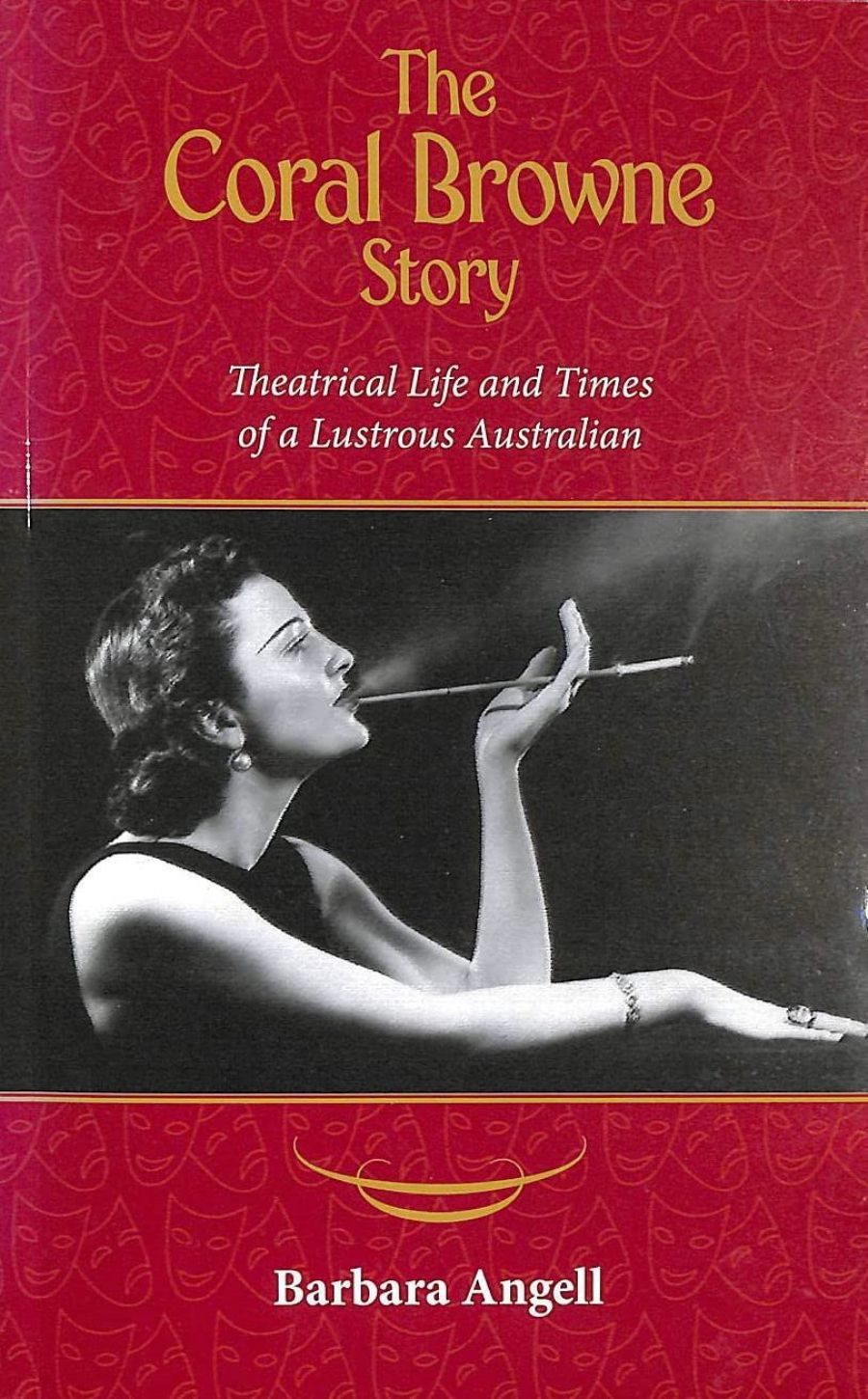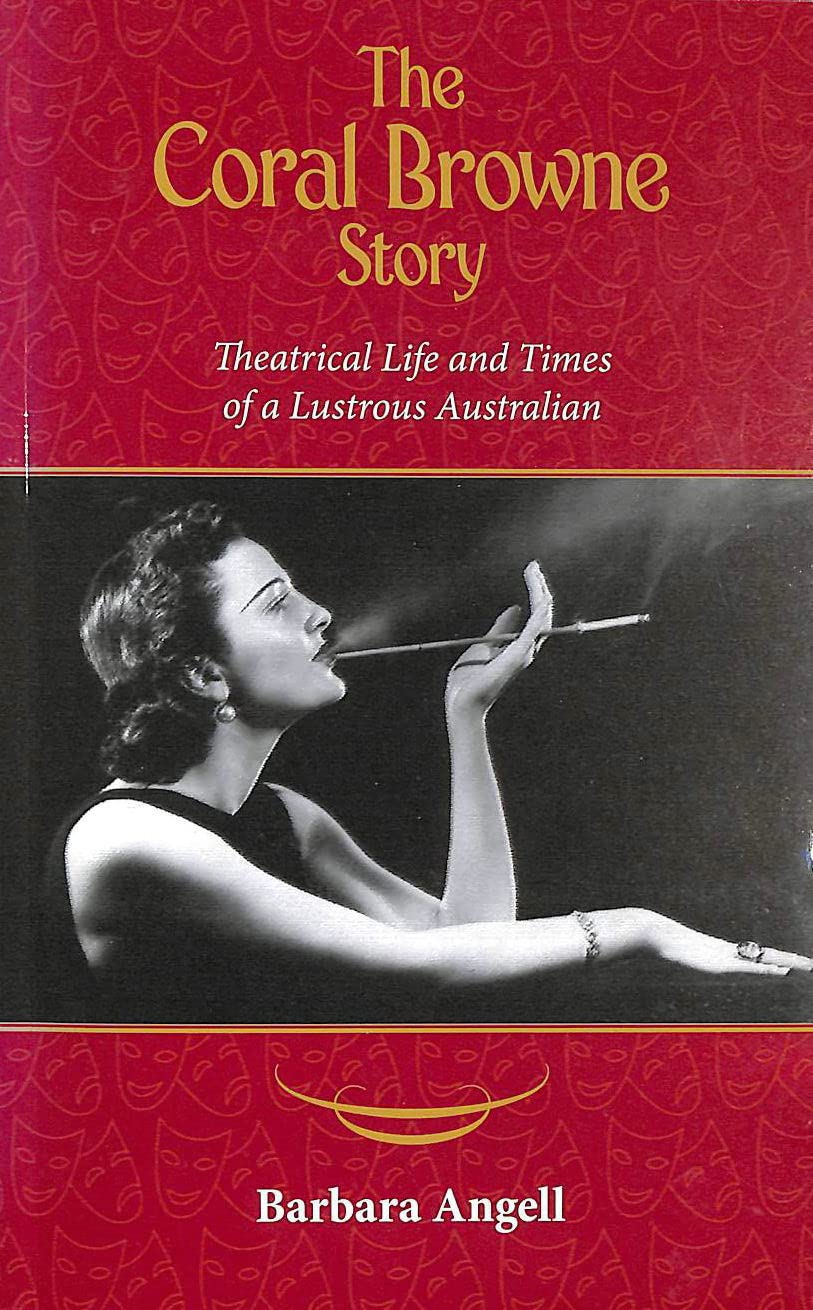
- Free Article: No
- Review Article: Yes
- Online Only: No
- Custom Highlight Text:
Loyalty and love she lavished free
On lowly friends and well-born,
Like Murdoch, Melba and like me,
She was marvellously MelbourneThe ‘she’ is actress Coral Browne (1913-1991); the ‘me’ is Barry Humphries; the quatrain is from Humphries’ eulogy – or elegy – A Chorale for Coral, which was ‘Very Privately Printed’ in 1992 after her funeral. In his memoirs More Please, which came out the same year, Humphries recalls listening to Browne ‘in the forties’ on the Lux Radio Theatre. In his subsequent autobiographical volume, My life as Me (2002), he recounts how she ‘had come to England to further her theatrical career in the early fifties ... and she was not only a marvellous actress but an infamous wit and the author of many legendary exchanges’.
- Book 1 Title: The Coral Browne Story
- Book 1 Subtitle: Theatrical life and times of a lustrous Australia
- Book 1 Biblio: Angell Productions, $35pb, 239pp
- Book 1 Cover Small (400 x 600):

- Book 1 Cover (800 x 1200):

Barbara Angell, in her own privately printed tribute to Coral Browne, does not refer to Humphries’ recollections. She does, however, treat us to bountiful samples of those mordant mots that made her subject at least the equal of that other infamous wit, and fellow-actress, Tallulah Bankhead. (They were equals in the fur-flaunting glamour stakes, too.) My favourite is Browne’s riposte – ineluctably Australian – to a scriptwriter who had voiced some reservations about Alan Bennett’s television play, An Englishman Abroad, in which Browne famously played herself: ‘You couldn’t write fuck on a dusty Venetian blind,’ she whipped back. Another prize example was her complaint to director Tyrone Guthrie on trying on some ludicrous wig he wanted her to sport in one of his zany productions: ‘I feel, darling, as if I’m looking out of a yak’s arsehole.’
What is distinctive about these acid drops, in comparison to Dorothy Parker’s, say, if not Bankhead’s, is that so many of them appear to have been concocted on the spot. And they were often laced with a genuine affection. In putting down the hack scriptwriter, the actress was also asserting her loyalty to Bennett, who had become a mate of hers. She had, after all, served him as a muse. The idea for An Englishman Abroad came to Bennett after Browne recounted a chance encounter with Guy Burgess in a Moscow theatre dressing room. She had been there on a Shakespeare tour in the late 1950s. She came to nurse something of an affection for Burgess as well, which occasioned another withering put-down. This time Browne rounded on a snooty salesman back in London who jibbed when she told him that the silk pyjamas she wanted to order were for the exiled spy: ‘It’s pricks like you,’ she told him, ‘that make me understand why he went. Thank Christ I’m not English.’
Addressing Guthrie as ‘darling’ might have been no more than routine lovey-speak, but Browne did chalk up an impressive score of impassioned and long-remembered affairs with the A-list of the theatrical profession – from Paul Robeson, Douglas Fairbanks Jr, Maurice Chevalier, and Jack Buchanan within her first few years in London, to Christopher Cazenove in the early 1970s (Cazenave was more than thirty years her junior). There is also the record of her devotedly loving, though possibly largely sexless, marriages to Philip Pearman (who died of cancer in 1964) and Vincent Price, alongside her myriad and long-lasting friendships inside and outside the theatrical profession, and the special generosity she showered, again and again, on nervous newcomers to the stage. Angell’s biography duly provides this record.
The Coral Browne Story also efficiently charts the highs and the lows of its subject’s theatrical career, and, while heavily dependent on interviews with surviving friends and colleagues, it demonstrates a sufficient familiarity with the written and published documentation (much of it collected by the subject herself and donated to Melbourne’s Performing Arts Museum) to put us on our guard when faced with the memories of personal ‘witnesses’, such as Humphries. As confirmed in these pages, the actress left Australia not in the 1950s but in 1934 – the year of Humphries’ birth – so he could not have heard her on Australian radio in the 1940s, unless in a replay or on the occasion of her first, and fleeting, return visit in 1948. Unlike Humphries, who did first leave Australia in the 1950s (right at the end). she came back again only once, in 1980.
A retailing of someone else’s witticisms and a more or less accurate cataloguing of the basic plot points in an individual’s life and career are not sufficient, however, to make other than routine biographical fodder. An evocative life of Coral Browne would first of all require some matching or complementary wit on the part of its author, and the most that this author can serve up is the rather schoolgirlish double entendre of its subtitle, ‘a lust-rous Australian’, and the odd wry phrase, such as ‘the ever swooping scalpel’ – alluding to Browne’s serial facelifts. There is precious little attempt to analyse the actress’s performances, apart from a ham-fisted critique of her self-portrayal in An Englishman Abroad. To accuse the queen of archness, a virtuoso of the raised eyebrow, of a lack of ‘naturalism’ defies all logic, including that of the author’s own argument, which is that ‘Coral came from a previous generation [of actors] where lines were “delivered”’. One has to be grateful here at least for the provision of a bit of historical context – even if it’s just theatre history – as this is notably deficient elsewhere in the book.
Browne had many fans, and I remain one, but we have to accept that she was probably neither famous enough nor significant enough to merit a large-scale study. Yet there are already rumours of another biography in the wings. Its only justification could be that it will somehow make of this Australian expatriate performer a representative figure of her breed and profession in a particular era. Angell quotes various observers’ impressions of her subject’s vestigial – and, in certain ways, more than vestigial – ‘Australianness’. She never once, however, takes the opportunity to probe what it might have been about the kind of Australia Browne knew and left behind – suburban Melbourne in the earlier twentieth century, the paradoxically classic locus of the Venetian blind – that could produce such an exotic hybrid: the plain-speaking grand-dame.
In this respect, you might see something symptomatic in Browne’s move in her early teenage years from Footscray to what Angell calls ‘the much nicer suburb of Kew’, though that is to risk stereotyping each of those suburbs and doesn’t help in explaining comparable puzzles of the breed, such as the emergence in slightly later generations of, say, Zoe Calwell from Glenferrie and Balwyn, Germaine Greer from Elwood or the alter ego of Dame Edna Everage from Camberwell. They had all left Australia by the 1960s, physically if not emotionally, and you would be hard pressed to find their equivalent today. (Cate Blanchett doesn’t quite cut the stinging mustard.) A deeper, broader study of Coral Browne’s sensibility and background might have yielded some of the secrets of these sphinxes from suburbia at a certain period of Australian history, and might also have helped explain why the breed is no longer being produced. There are no more Tallulahs, either, but as Senator Bankhead’s daughter, it is easier to understand how she came by her hauteur.
Barry Humphries, when he talks about Coral can get his facts wrong and having no pretensions to writing a biography, he needn’t pause for sociological or psychological explanations. But with a few deft strokes he captures perfectly all the things that made her classically, if not typically, Australian and, at the same time, beyond categorisation, without compare. His eulogy ends:
Uniquely-minted Queen of Style
No counterfeit could coin you,
Long may you make the angels smile
Till we all fuck off to join you.
Barbara Angell’s smile could well be on the other side of her face if she ever has to confront her formidable subject in paradise.


Comments powered by CComment